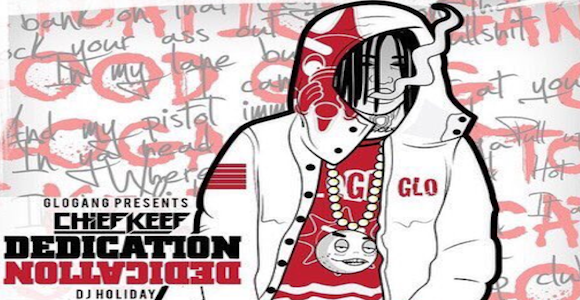
A tedious slog of dope dealer metaphors, “Cook” grates from the jump and scarcely lets up.

Though simplicity and repetition stay Keef’s motif, nothing on Dedication comes close to the unpretentious raison d’être raps of “Don’t Like”. Ostensibly classified as an album, Dedication’s anniversary proximity compels at least a cursory comparison with Finally Rich, which despite its flaws holds up better than expected. The Two Zero One Seven and Thot Breaker mixtapes continued his post-Interscope penchant for self-production, with the latter of these garnering a modest amount of critical recognition. Some consider 2017 a bit of a comeback year for Keef, a position loosely supported by his return to prolificity. While remaining notable for his earlier accomplishments, he seemed ready to return to cult status and stay there.

In effect, the shift in focus left Keef’s career to wane and wither even as he dropped projects like Bang 3 and Sorry for the Weight and guested on tracks by ascendant artists Mac Miller and Travis Scott. Relieved of the inconvenient pressures of grappling with an apparently amoral artist, the music media instead leaned in towards the troubled city’s more digestible Chance the Rapper, preemptively dubbing him a star and then doing the heavy lifting to make it happen. By the end of 2014, he’d lost his Interscope deal. Legal troubles kept cropping up, with probation violations disrupting more than just his career. Keef, of course, did himself and his peers few favors by no-showing for the “Hate Being Sober” music video shoot and multiple scheduled concerts. That evident lack of faith from the label diluted the promise of Finally Rich and effectively put a damper on subsequent prospects from the scene.

Even after viral hits “Don’t Like” and “Love Sosa” demonstrated that the still-teenage artist didn’t need to call on famous fiends to make it in the competitive rap marketplace, Interscope nonetheless stacked his debut album with the comparatively more established likes of 50 Cent, Rick Ross, and Young Jeezy. Released five years ago this month, Chief Keef’s Finally Rich album served as drill’s major label introduction and, in time, its unlikely reckoning. With a veritable epidemic of gun violence in the Windy City making national headlines and stories amplified as the state’s former junior senator had just so happened to become president, the unapologetically nihilistic music updated the old gangsta rap aesthetic for a new generation’s consumption. Prior to being completely superseded by Atlanta’s trap movement, Chicago’s drill scene commanded a significant portion of the hip-hop narrative. Before Offset, Quavo, and Takeoff, there was Fredo, Keef, and Reese.


 0 kommentar(er)
0 kommentar(er)
